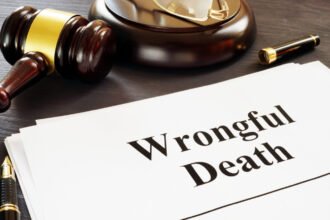Unlike many other types of professional arrangements, where a financial transaction takes place between a paying client and a provider, healthcare relationships go far beyond monetary exchanges.
These interactions are built on trust rather than money. After all, when we turn to healthcare professionals, we entrust them with what is most precious to us: our health or the well-being of those we love most.
This is why, when a loved one tragically loses their life due to negligence or errors in a medical setting, the emotional toll on families can be devastating.
Even amidst the anguish you may feel right now, it’s essential to remember that the law offers avenues to pursue justice and compensation. This guide seeks to clarify the legal framework surrounding wrongful death claims, empowering you with the knowledge needed to take the next steps.
What Constitutes a Wrongful Death in Healthcare?
A wrongful death occurs when a person’s life is prematurely ended due to the negligence or misconduct of another party. In healthcare, this often involves medical malpractice, such as:
- Misdiagnosis or delayed diagnosis
- Surgical errors
- Medication mistakes
- Failure to provide adequate care
- Breach of patient safety protocols
These cases are not just about identifying errors but also proving that these mistakes directly caused the death.
The Legal Process of Filing a Wrongful Death Claim
Filing a wrongful death claim begins with identifying whether you have legal standing to bring the case forward. In most jurisdictions, immediate family members, such as spouses, children, or parents of the deceased, are typically eligible to file.
Once standing is established, the next step is to consult wrongful death solicitors. They will help evaluate the circumstances to determine if negligence, malpractice, or a breach of duty occurred.
The solicitor will gather crucial evidence, which may include medical records, witness statements, and expert testimony, to build a strong case. This data will demonstrate that the responsible party owed a duty of care, breached that duty, and caused the death as a result.
After the case is prepared, a formal claim is filed with the appropriate court. The lawsuit must outline the facts of the case, the damages being sought, and the legal basis for the complaint. The court will then notify the defendant, who has the opportunity to respond. This stage often involves a pre-trial process where both sides exchange evidence and attempt to negotiate a settlement.
If an agreement cannot be reached, the case may proceed to trial. During the hearing, both parties will present their evidence, call witnesses, and make arguments to the court. The judge or jury will then decide whether the defendant is liable and, if so, determine the compensation owed.
Throughout the process, deadlines—referred to as statutes of limitations—must be strictly adhered to. While the process can be emotionally taxing, an experienced legal professional can guide families through each step.
The Role of Wrongful Death Solicitors
Wrongful death solicitors play a pivotal role in supporting families through these challenging times. They offer:
- Legal Guidance: Explaining rights and legal options in clear, compassionate terms.
- Case Management: Handling documentation, evidence collection, and negotiations.
- Advocacy: Representing families in court or during settlement discussions.
For healthcare professionals, understanding these claims is equally important. Awareness of legal accountability can help foster better practices and reduce the risk of similar incidents in the future.
How Awareness Empowers Healthcare Professionals
The legal framework surrounding wrongful deaths serves as a reminder of the critical importance of accountability. When viewed constructively, it encourages physicians and nurses to reflect on their practices, prioritise continuous education, and stay updated with evolving medical guidelines.
Additionally, understanding the implications of negligence can lead to more open communication with patients and their families. Transparent discussions about risks, treatments, and expectations foster trust and help manage outcomes effectively, reducing misunderstandings that often lead to disputes. Awareness of the legal landscape can also prompt the implementation of preventive measures, such as better documentation, regular audits, and investment in technology to minimise errors.
Seeking Justice, Driving Change
The loss of a loved one is an unimaginable tragedy, but understanding the legal framework of wrongful death claims provides a path to justice and healing.
For families, it represents an opportunity to hold accountable those who failed in their duty of care, offering not just closure but a chance to honour their loved one’s legacy. For healthcare professionals, these cases are a solemn reminder of the weight their actions carry and the profound impact of their decisions.
Fostering accountability, compassion, and a commitment to excellence transforms these tragedies into catalysts for a safer, more humane healthcare system.








